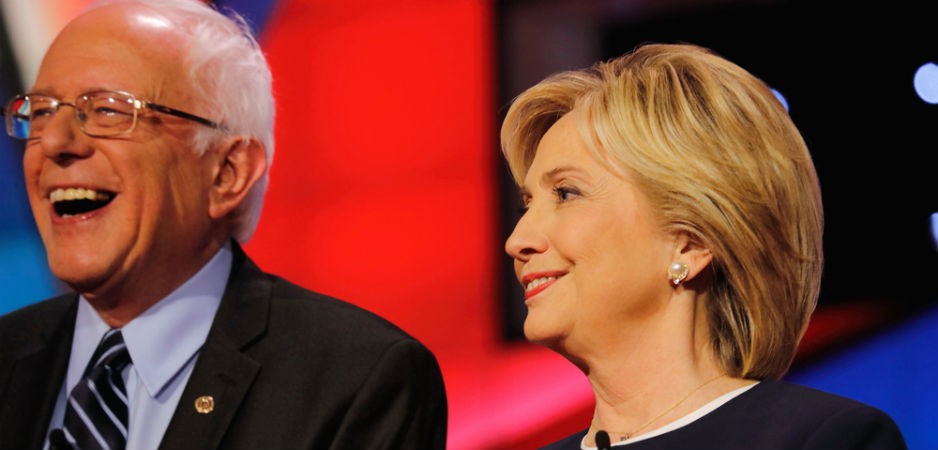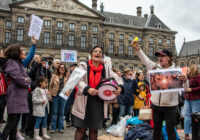The pope’s talk about World War III is unwise because of its timing and its implications, as well as the track record of the Roman Catholic Church.
Pope Francis is a fine fellow. He rails against inequality, rallies for the environment and fights corruption in his Kremlin-like state. On November 13, Caroline Wyatt of the BBC suggested that Francis’ “Vatican reforms may be starting to bite.” For far too long, the Roman Catholic Church has been plagued by “greed and mismanagement” that puts FIFA to shame. Now, Francis has decided to take on his fellow clergymen who lead “the life of a pharaoh.” This “barefoot pope” from the land of liberation theology is shaking up his age-old opaque organization that has so far been run by fusty old Europeans with a penchant for la dolce vita.
While there is much to admire about Pope Francis, he has erred egregiously in declaring that the attacks in Paris are “a piece” of the “piecemeal Third World War.” He first declared this in 2014 while “standing at the altar beneath Italy’s fascist-era Redipuglia memorial.” The Argentine pope’s Italian grandfather had fought in World War I against the Austro-Hungarian Empire, and it must have been a sentimental occasion for him to visit the gravestones of 100,000 Italian soldiers. Yet Francis is inadvertently entering dangerous country. “War is madness,” in his words, and he believes the Paris attacks do not represent Islam. Yet when he mentions a Third World War, he evokes ghosts from the past that still haunt us and menace peace.
Francis presides over an institution that is no stranger to violence. On November 27, 1095, Pope Urban II sought to unite conflict-ridden Europe under his leadership by launching Crusades. By now, Muslim Seljuq Turks controlled the Holy Land and Urban II wanted it back in Christian hands. He granted remissions for all sins of those who participated in the Crusades. An estimated 60,000 to 100,000 knights, peasants and serfs responded to Urban’s call. They set off for Jerusalem via Constantinople.
What followed Urban’s clarion call was centuries of war that is now sanctified in myth. Even today, the statue of Richard the Lionheart, sword in hand on a stately steed, guards the Palace of Westminster, the home to the Houses of Parliament in London. Pope Urban II himself was beatified in 1881. As per the Catholic Encyclopedia, through beatification the church “honors the saints because of the Divine supernatural gifts which have earned them eternal life, and through which they reign with God in the heavenly fatherland as His chosen friends and faithful servants.” Like a lot of religious doctrine, this is humbug. Yet it stubbornly continues to be a part of the Catholic creed.
 Even Francis cannot make his geriatric institution open, transparent and democratic. Like all of us, he is a prisoner of the past. The Roman Catholic Church is the same institution that burnt Giordano Bruno in 1600. As late as 2000, Cardinal Angelo Soldano, the dean of the College of Cardinals and secretary of state, defended Bruno’s inquisitors. In the past, the church enforced dogma through Inquisition and was highly intolerant. Jews had to flee fanatical Spain to take refuge with tolerant Ottomans. Until recently, these Jews spoke Ladino, an old form of Spanish that is now dead in the Iberian Peninsula. As an Argentine, Francis must know fully well that he presides over an organization that once exterminated indigenous cultures and participated in the genocide of native populations. More recently, Pope Francis’ church sided with Latin American military regimes that censored, tortured and jailed their citizens. Hence his talk of a Third World War sends shivers down many spines.
Even Francis cannot make his geriatric institution open, transparent and democratic. Like all of us, he is a prisoner of the past. The Roman Catholic Church is the same institution that burnt Giordano Bruno in 1600. As late as 2000, Cardinal Angelo Soldano, the dean of the College of Cardinals and secretary of state, defended Bruno’s inquisitors. In the past, the church enforced dogma through Inquisition and was highly intolerant. Jews had to flee fanatical Spain to take refuge with tolerant Ottomans. Until recently, these Jews spoke Ladino, an old form of Spanish that is now dead in the Iberian Peninsula. As an Argentine, Francis must know fully well that he presides over an organization that once exterminated indigenous cultures and participated in the genocide of native populations. More recently, Pope Francis’ church sided with Latin American military regimes that censored, tortured and jailed their citizens. Hence his talk of a Third World War sends shivers down many spines.
The pope’s talk of a piecemeal Third World War is naïve, misguided and dangerous.
First, the timing of the comment could not be worse. France has joined countries such as Sweden, Hungary and Poland in closing its borders. The far-right is on the rise in much of Europe. In the United States, 28 governors have declared that they will not accept Syrian refugees. Some are willing to accept Christians, but certainly not Muslims. Donald Trump, a flamboyant presidential candidate with billions in the bank, is calling for expanded surveillance, monitoring mosques, tracking Muslim Americans, giving them special identity cards and even searching them without warrant. Pope Francis is providing ammunition for politicians like Trump by painting the specter of a world war.
Second, the idea of World War III evokes visions of apocalypse. It fosters fear and exacerbates the paranoia plaguing Europe and the US. When al-Qaeda attacked America, the country acted out of fear to create a surveillance state and wage war against Saddam Hussein. This brutal dictator had used chemical weapons against his own people, but he had no hand in the attacks of September 11, 2001. Yet in the hysteria that followed, George W. Bush and Tony Blair flouted international law with impunity to launch a war that was based on a laughable lie: Iraq possessed weapons of mass destruction.
Worst of all, the US regressed culturally and legitimized torture. This was a civilizational fall for a country that sees itself as a shining “City upon a Hill.” Glenn Carle, a former high ranking official of the Central Intelligence Agency (CIA), points out the irony of Uncle Sam practicing waterboarding when it had executed Japanese soldiers for conducting the same exercise during World War II. During this period, the infamous Executive Order 9066 called for the relocation and internment of its Japanese citizens. The idea of World War III will give people like Senator Tom Cotton the green light to lock-up and even torture American Muslims. Tragically, Francis is inadvertently emulating Urban.
Finally, Francis is completely wrong about a piecemeal Third World War. Carl von Clausewitz, the Prussian military philosopher, declared war as “nothing but a duel on an extensive scale” where “each strives by physical force to compel the other to submit to his will.” A war is certainly taking place in Syria where President Bashar al-Assad and the Islamic State are fighting a duel and attempting to impose their will. However, what this author has called the Middle East’s Thirty Years’ War is no world war: It is a regional war with multiple actors and large-scale foreign intervention.
The so-called War on Terror was never a war. The US did not have a defined objective or a clearly identifiable enemy. It did succeed in eliminating Osama bin Laden and in conquering Iraq. Yet it could not bring peace to the land. American blunders destroyed the fabric of Iraqi society and led to the emergence of the Islamic State that is imposing a reign of terror that makes Maximilien Robespierre appear mild and merciful by comparison. This fanatical, bloodthirsty and medieval organization is conducting murder, torture and rape on a mass scale. It kills or enslaves minorities like Yazidis. It is destroying priceless treasures of the past such as Palmyra. Worse still, the Islamic State is preying on old hatreds, appealing to puritanical Islamic doctrine and providing a vacuous vision of virtuous utopia for the future.
The Paris attacks demonstrate that the Islamic State is expanding its operations. It is no longer content with unleashing terror in Baghdad, Mosul and Raqqa. Terror is now to be exported to supposedly sinful cities like Paris. Yet the Islamic State is in no position to fire missiles, send ships and roll tanks into any NATO country, including Turkey. The US, Britain, France and Russia are all battling the Islamic State, but certainly not waging war against it.
Terror, as this author pointed out last week, is merely a symptom of the deep disaffection and the disintegration of the political, economic and social fabric. Since the 19th century, it has been a tool of revolutionaries against repression, imagined or real. Russian, Irish, Tamil, Basque, Sikh and other groups have taken to terror to achieve their ends. The Islamic State is a product of the failed promises of Arab socialism and globalization. It is easy to forget that both Syria and Iraq were homes to Baathist parties that wanted a “just redistribution of wealth.” Globalization promised freedom and better lives to all. In an unequal, oppressive and disillusioned society, people are returning to religion for solace. Some are even turning fanatical.
The Islamic State draws its support from fanatics who are angry and impressionable. People who feel marginalized and victimized present ripe pickings. Therefore, the drone strikes of the US are counterproductive. Four former air force members have written to US President Barack Obama that drone strikes have “fueled the feelings of hatred” that ignite terrorism. In 2014, the US targeted 41 people via drone strikes, but ended up killing 1,147. Clearly, far too many people killed were innocent. These former soldiers are right in pointing out that killing civilians is one of the most “devastating driving forces for terrorism and destabilization around the world.”
Conflict is inevitable in a world of over 7 billion people. Eventually, rogue elements will acquire weapons of mass destruction. Biological, chemical and even nuclear strikes will occur. Yet even such large-scale violence is unlikely to lead to a Third World War. Millenarian militants such as the Islamic State will wither away. The horrors they impose will prove too much to bear. However, extreme ideologies and terror will persist in another form. We have to learn to live with them instead of fearing our own shadows.
*[You can receive “The World This Week” directly in your inbox by subscribing to our mailing list. Simply visit Fair Observer and enter your email address in the space provided. Meanwhile, please find below five of our finest articles for the week.]
The Lament of an American Muslim
An American Muslim reflects on rising Islamophobia in the United States following the attacks in Paris.
My grandfather used to have prayer beads made of sandalwood. I remember him sitting on his prayer mat, murmuring quietly, letting his precocious granddaughter climb on him. The Prophet Muhammad had done the same, he would say, smiling.
Oddly enough, every time I smell sandalwood or think of my grandfather’s whispered prayers, my heart aches. I wonder how horrified he would have been at last December’s Taliban attack that left more than 100 children dead in Pakistan. I wonder what he would have thought of people saying his prayers were frightening.
My odd sense of humor comes from him, too. When I was younger, he used to say I lit up the house with laughter. These days, I have lost count of the number of people who tell me I’m too serious.
I am not serious. I am stricken with grief. I am in a permanent state of mourning and, the thing is, the American media… Read more
US Governors Must Stop Playing Politics With Refugee Lives
Anti-refugee statements by American governors are stoking a climate of fear and resentment.
Statements by 28 US governors that their states will not welcome Syrian refugees—or in some cases only those who are Muslim—are indefensible. Many analysts have noted that governors have no legal authority to deny entry to refugees, but their statements nevertheless suggest a reprehensible willingness to make refugees’ lives even more difficult. Moreover, use of a leadership position to promote suspicion of refugees perpetuates a culture of selective compassion, encouraging hate crimes and discrimination.
It is highly unlikely a Syrian refugee played a role in the recent Paris attacks. Syrian refugees are, after all, fleeing the very type of violence perpetrated in Paris and are hated and targeted by Daesh (Islamic State). The attacker near whose body a Syrian passport was found is not known to have received approval for refugee status from any country, and it’s possible the passport was a forgery, and/or possibly intended to provoke retaliation against refugees. Yet even were a Syrian refugee… Read more
Sustainable Development is a Lie
The term “development” is just colonialism applied to the natural world, says Derrick Jensen.
“Sustainable development” is a claim to virtue. The word “development” used in this sense is a lie.
The word “develop” means “to grow,” “to progress,” “to become fuller, more advanced.” Some synonyms are “evolution, unfolding, maturation, ripeness,” and some antonyms are “deterioration, disintegration.” And here is a real usage example from a dictionary: “Drama reached its highest development in the plays of Shakespeare.”
But here’s the problem: A child develops into an adult, a caterpillar develops into a butterfly, a stream harmed by (say) mining might possibly in time develop back into a healthy stream; but a meadow does not “develop” into white-box houses, a bay does not “develop” into an industrial port, a forest does not “develop” into roads and clearings.
The reality is that the meadow is destroyed to make the “development.” The bay is destroyed to “develop” it into an industrial port. The forest is destroyed when the “natural resources” are “developed.” The word “kill” works… Read more
Clinton, Sanders, Trump? Just Ask a Casting Director
By looking at casting directors and Hollywood, Amy Cook examines who will stand in the 2016 US presidential election.
If you want to know who won the last debate or who will win the next one, you shouldn’t ask a political pundit—you should ask a casting director.
We Americans would like to believe that we are choosing a candidate for president based on who makes the best arguments or advances the best policies, but it is more honest to admit that we are looking for a leading man or woman to play a theatrical role.
While it is a cliché that we vote for candidates as if for an actor playing a role, recent insights from both researchers of stereotyping and insights from actual casting directors show it is true. I am a theater director and scholar who integrates cognitive science into my study of Shakespeare, performance and audience response, and this primary season feels like a casting call where there is really only one choice for the role… Read more
The Paris Tragedy and the End of Strategic Thinking
Everything indicates that the West has given up on strategic thinking.
The horrendous and carefully synchronized attacks in Paris on November 13 have provided a new occasion to fill the airwaves and pages of the press with the familiar themes, memes and sentiments our skilled rhetoricians in politics and the media are so good at trotting out. The database of scripts to read from is there for all to exploit. Listening in the immediate aftermath to French President François Hollande, who was clearly wondering how best to recycle his ten-month-old “Je suis Charlie” speeches, I couldn’t help hearing the echo of George W. Bush in late 2001. Reuters succinctly summed up the surreal comedy of it in a single sentence. “Faced with war, the country must take appropriate action,” he said, without saying what that meant.
Appropriate action? Hell, we don’t even know what “war” means these days: conflicts between nations or military mobilization against criminal bands? So how are we to judge what the appropriate decisions might… Read more
The views expressed in this article are the author’s own and do not necessarily reflect Fair Observer’s editorial policy.
Photo Credit: Giulio Napolitano / Shutterstock.com
 We bring you perspectives from around the world. Help us to inform and educate. Your donation is tax-deductible. Join over 400 people to become a donor or you could choose to be a sponsor.
We bring you perspectives from around the world. Help us to inform and educate. Your donation is tax-deductible. Join over 400 people to become a donor or you could choose to be a sponsor.
Support Fair Observer
We rely on your support for our independence, diversity and quality.
For more than 10 years, Fair Observer has been free, fair and independent. No billionaire owns us, no advertisers control us. We are a reader-supported nonprofit. Unlike many other publications, we keep our content free for readers regardless of where they live or whether they can afford to pay. We have no paywalls and no ads.
In the post-truth era of fake news, echo chambers and filter bubbles, we publish a plurality of perspectives from around the world. Anyone can publish with us, but everyone goes through a rigorous editorial process. So, you get fact-checked, well-reasoned content instead of noise.
We publish 2,500+ voices from 90+ countries. We also conduct education and training programs
on subjects ranging from digital media and journalism to writing and critical thinking. This
doesn’t come cheap. Servers, editors, trainers and web developers cost
money.
Please consider supporting us on a regular basis as a recurring donor or a
sustaining member.
Will you support FO’s journalism?
We rely on your support for our independence, diversity and quality.











